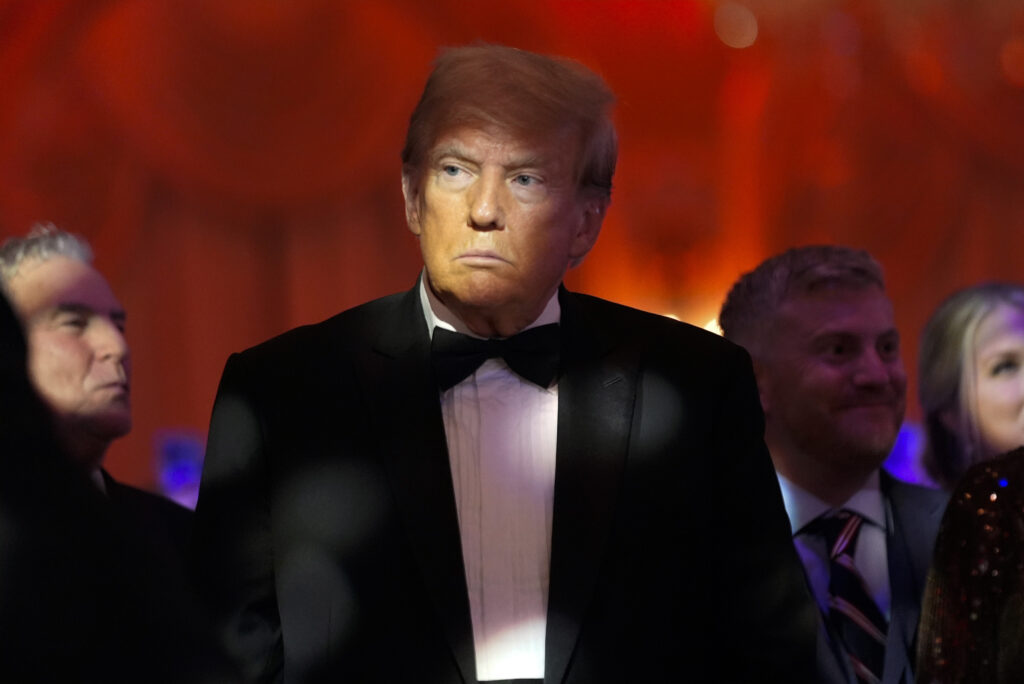To Serve a Third Term, Trump Would Have to Defy the Constitution

The 22nd Amendment of the U.S. Constitution is clear: “No person shall be elected to the office of the President more than twice.” And yet, President Donald Trump may think he can somehow skirt that law.
In a recent interview with NBC News, Trump did not rule out a third term in the White House, emphasizing that he is “not joking” about somehow defying the Constitution.
“A lot of people want me to do it,” Trump said. “But, I mean, I basically tell them we have a long way to go, you know, it’s very early in the administration.”
The comments have already prompted some controversy in Congress, with Rep. Dan Goldman (D-N.Y.) introducing a House resolution reaffirming term limits for presidents. Conversely, Rep. Andrew Ogles (R-Tenn.) introduced a House resolution proposing a change to the Constitution to allow someone to be elected president a third time if they didn’t serve two consecutive terms.
A lawyer for Trump looked into ways around the 22nd Amendment in 2023, the Wall Street Journal reported Wednesday.
The 22nd Amendment was drafted in the aftermath of Franklin Delano Roosevelt’s death in 1945. Roosevelt was the only president who served more than two terms in the White House — though the two-term limit wasn’t law but a long-held precedent honored by all previous presidents. In 1940, with America edging closer to entering World War II, and still in the aftermath of the Great Depression, Roosevelt had made a compelling case to voters to stay in the White House for a third term. By 1947, Congress approved the 22nd Amendment and it was ratified into the U.S. Constitution by 1951.
It’s clear Trump can’t run or be elected for a third term. But there are a few theories floating around about how he could legally end up president again. Most rely on the fact that the language of the amendment bars a third “election,” but doesn’t explicitly say a president can’t serve a third term. The most popular theories involve Vice President JD Vance running in 2028 with Trump as his running mate, and then stepping down after he’s elected.
But most legal scholars agree that these theories are bunk.
“Thinking a President can serve a third term through some ingenious scheme … is like thinking a VP can preside over his own impeachment trial, the constitutional equivalent of a scrivener’s error,” Jamal Greene, a constitutional law scholar at Columbia Law School, posted on BlueSky. “Constitutional law isn’t a word game.”
Writing online, constitutional scholar Michael Rosin also threw water on this theory, explaining that, with the 22nd Amendment, Trump “cannot be elected President again and therefore he cannot be elected Vice President.”
Aziz Huq, a constitutional law scholar at the University of Chicago Law School, told Democracy Docket that while “there are sort of clever, in the pejorative sense, lawyerly arguments for how Trump might circumvent it,” there’s no way of interpreting the 22nd Amendment other than to impose a two-term limit for U.S. presidents.
But the real danger, said Huq, isn’t how Trump might try to skirt the rules to serve a third term. It’s that he will ignore the rules altogether, and no one will stop him. After all, the Trump administration recently appeared to ignore a court’s order to halt the deportation of hundreds of Venezuelans to El Salvador without due process, setting off a potential constitutional crisis.
“We’re at a political moment where all sorts of legal limits and constitutional limits are just being flatly ignored,” Huq said.
The power of the 22nd Amendment is only as good as the court’s willingness to enforce it. And given how the Supreme Court ruled last year’s case about presidential immunity — in which it handed Trump a victory that legal scholars said could set a dangerous precedent — Huq doesn’t have faith that the nation’s highest court would prevent Trump from serving a third term.
“I don’t think the question is, ‘Well, what does the law allow?’ I think the question is, ‘who stands behind the law? Are the relevant actors going to enforce the law?’” he said.
The whole situation creates a catch-22, Huq added. Taking Trump’s comments about a potential third term seriously legitimizes pseudo-constitutional arguments that aren’t normally worth paying attention to. But ignoring these theories also allows them to fester.
“Either way, it does damage to the law of democracy,” Huq said. “It just seems to me a no-win situation.”